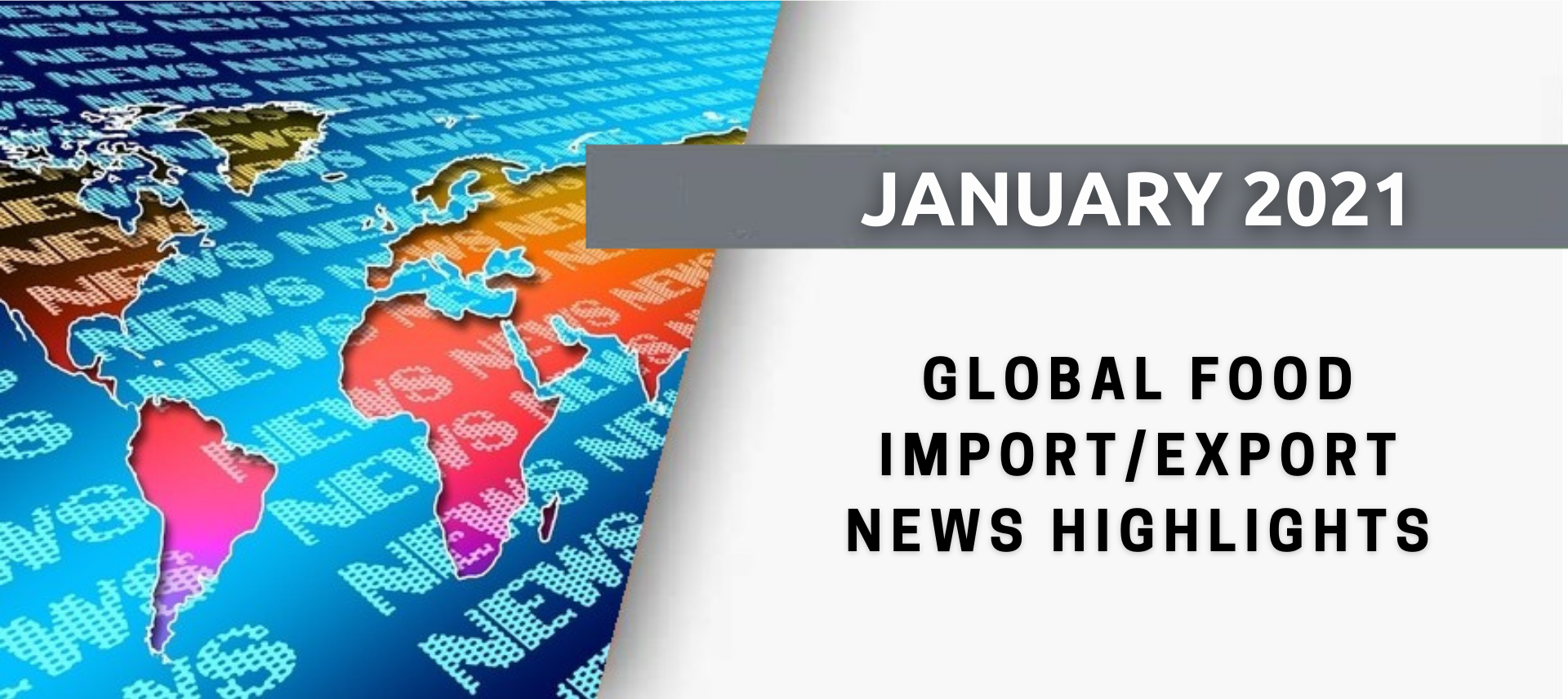The food industry has just entered 2021, leaving behind an agitated year of a worldwide health crisis, uncertainty, restrictions and many other anxieties and challenges that still linger in the present. 2020 brought businessmen working in the food supply chain countless hurdles trying to conform to the situation and make ends meet. In the new year that just began, it is vital for food importers and distributors to maintain their ability to adapt, by staying informed about the food trade industry, both locally and internationally, and prepare for the future.
Russia extends ban on western food import
Many western countries, including the EU, US, and Canada among others, imposed trade sanctions against Russia after its involvement in the military conflict in the Crimean peninsula of Ukraine in 2014, restricting Russia`s access to global markets. In retaliation, to protect the national interests of the country, the Russian Federation has banned several agricultural products from the countries involved in applying these economic sanctions.
Recently, Russian President Vladimir Putin signed a decree extending several economic measures on countries that imposed sanctions on Russia. The decree prohibits through the end of 2021, the import into Russia of several food ingredients and products, from several countries, including all EU Member States, as well as the UK which was added to the list post-Brexit. The Russian embargo on Western food imports has affected many nations heavily reliant on the Russian market, especially European countries, damaging prices, supply and forcing producers to find alternative markets for their goods.
Brexit`s red tape affects the UK food import
Since Brexit became official on the 1st of January, London and Brussels have now their own regulations, including mandatory border checks. The food and drink industry is at present controlled by new rules and standards, challenging both food importers and exporters.
Several businesses are at present reporting problems with increased paperwork that jeopardise their capacity to import and feel at risk as European producers are avoiding the red tape. New regulations state that every item now has to be coded and noted in transportation records at the border prior to entering the UK. The country`s departure from the EU has also made food import more expensive and slow. Foreign producers that export their goods to the country, as well as UK importers that stock from the outside have reported concerns about the new procedures as well as delays in trade and uncertainty about how long they might last.
Nevertheless, British retailers and food business are doing their best regarding these new regulations, stockpiling and struggling to offer fresh food, although the cuts in food import may force the country to lower their standard in food supplies from the outside world, in order to be able to feed the population.
Canada invests in a modern food safety system for its importers and exporters
The government of Canada has declared that it is investing $128 million, in addition to the current funding, in the Canadian Food Inspection Agency (CFIA) over the next five years, to sustain the country`s food safety system. The investment is also aimed to protect the health of plants and animals, as well as help the import-export sector in these times of global crisis and trade fragility, to aid the image of Canada as a trading partner. Canadian food importers and exporters will benefit from quick, modern, automated tools to manage trade, as well as monitor the discovery of food anomalies.
EU`s food sustainability strategy
The European Green Deal is EU`s plan that brings together an umbrella of policies designed to help climate and environmental difficulties, ensuring a green transition on many levels, including achieving carbon neutrality by 2050 or circular economy among many others. A core part of the EU`s Green Deal commitment stands in the Farm to Fork Strategy, published last year, that focuses on ensuring a framework designed to aid a sustainable and efficient evolution of the food system, regarding issues like public health, food affordability, fair trade, sustainable food supply chain etc.
Through the Farm to Fork Strategy, the European Commission aims to initiate a ‘code of conduct’ to facilitate a standard for sustainability in the food system, by collecting feedback from producers, retailers, foodservice operators, hospitality sector, NGOs, public authorities, as well as consumption patterns, and other relevant players.
China’s food trade fast recovery is aiding the global economy
Numbers in China`s food imports and exports have risen steadily in recent months, showing the country`s economy is recovering from the Covid pandemic and contributing to the global economy. The country`s food trade growth momentum was most visible as more trading countries lifted corona restrictions. China`s import of food is not only pleasing customers but also aid the regeneration of food traffic among borders. Most imported agricultural products in China were meat, seafood, milk, as well as herbs and spices.
